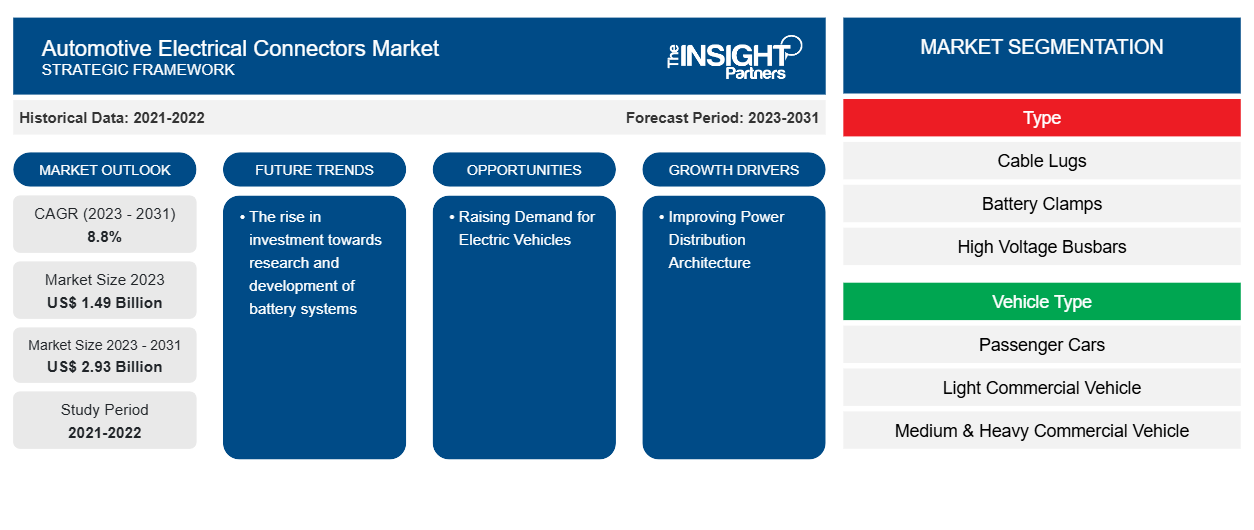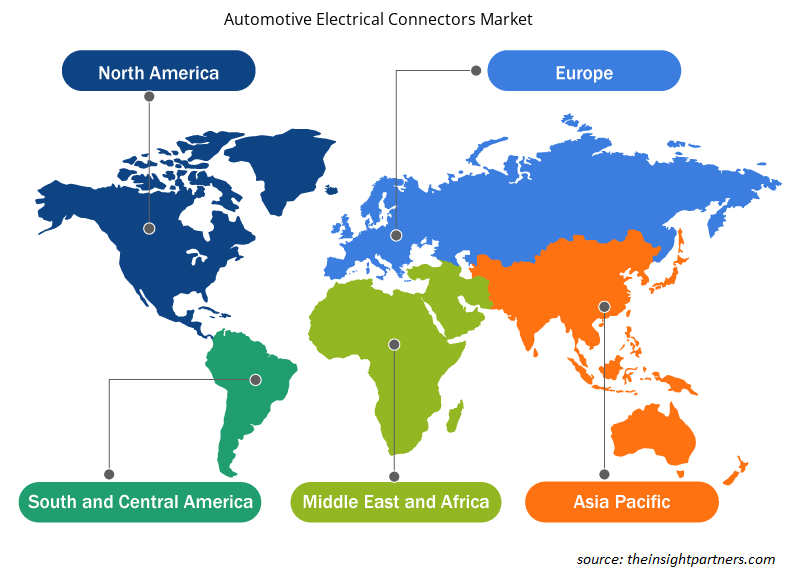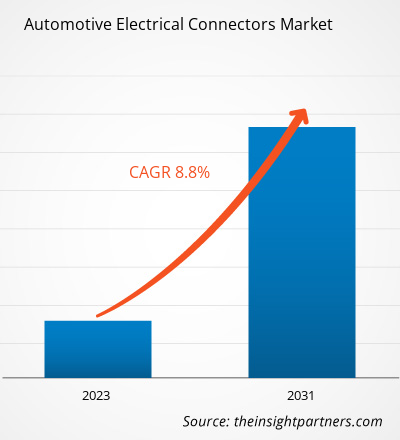The automotive electrical connectors market size is projected to reach US$ 2.93 billion by 2031 from US$ 1.49 billion in 2023. The market is anticipated to grow at a CAGR of 8.8% during 2023–2031. The rise in investment in the research and development of battery systems is likely to remain key trends in the market.
Automotive Electrical Connectors Market Analysis
An increase in the electrification of transport infrastructure and vehicles across the globe is expected to drive the demand for automotive electrical connectors, which in turn is expected to fuel the market growth in the coming years. In addition, improvement of power distribution architecture is projected to boost the automotive electrical connectors market growth during the forecast period. Moreover, the rising in demand for electric vehicles and hybrid electric vehicles is projected to create opportunities for the key companies operating in the market from 2023 to 2031.
Automotive Electrical Connectors Market Overview
The automotive electrical connectors market ecosystem comprises the following stakeholders – raw material providers, connector manufacturers, OEMs, and end users. The raw material providers supply the material to build the automotive electrical connectors, such as copper, nickel, and silver. Also, small components range from a small screw to an enclosing box. The connector manufacturers carry out various processes, such as designing, assembling, and production, to transform raw materials into finished products. INTERCABLE srl, Amphenol Corporation, and Rogers Corporation, among others, are leading manufacturers of automotive electrical connectors.
The companies are offering a various types of products such as cable lugs, high voltage busbars, battery clamps, and fuse boxes to vehicle manufacturers and aftermarket customers. These electrical connectors are procured by OEMs such as Volkswagen, Toyota, Volvo, Daimler, and Ford Motor Company. The end-users hold a large number of customers, from personal use vehicle buyers to fleet operators. The automotive electrical connector manufacturing companies also provide aftersales service to customers for replacing the vehicle connectors.
Customize This Report To Suit Your Requirement
You will get customization on any report - free of charge - including parts of this report, or country-level analysis, Excel Data pack, as well as avail great offers and discounts for start-ups & universities
Automotive Electrical Connectors Market: Strategic Insights

- Get Top Key Market Trends of this report.This FREE sample will include data analysis, ranging from market trends to estimates and forecasts.
You will get customization on any report - free of charge - including parts of this report, or country-level analysis, Excel Data pack, as well as avail great offers and discounts for start-ups & universities
Automotive Electrical Connectors Market: Strategic Insights

- Get Top Key Market Trends of this report.This FREE sample will include data analysis, ranging from market trends to estimates and forecasts.
Automotive Electrical Connectors Market Drivers and Opportunities
Improving Power Distribution Architecture to Favor Market
Developed nations such as the US, the UK, and Germany are firmly shifting toward the use of electric vehicles. Companies operating in the developed region are developing high-voltage battery technologies to enhance vehicle power and energy storage capacity. Thus, the demand for supporting connectors to provide efficient power connections is growing, thereby bolstering the market growth. New electrical products such as fuse boxes, cable lugs, and busbars are being developed to improve power distribution. Fuse boxes are required to maintain efficient power distribution, which is boosting the demand for fuse boxes, thereby driving the market.
For instance, in April 2021, Eaton, the eMobility business segment, was awarded a contract to develop Bussmann series fuses and power distribution units (PDUs) for vehicle manufacturers. The PDUs, also known as fuse boxes, will be used for a new battery-electric vehicle (BEV) for light-duty commercial applications. Fuse boxes transmit battery power to vehicle components with a safety function by providing circuit protection. The changing power distribution architecture is creating the demand for new fuse boxes, thereby boosting market growth.
Raising Demand for Electric Vehicles
Governments of different countries issue specific regulations to control emissions from diesel and gasoline vehicles. Therefore, due to this standard, vehicle manufacturers are shifting their focus toward the production of plug-in hybrid vehicles, hybrid vehicles and battery-electric vehicles. Vehicle emissions are the leading source of pollution worldwide, and vehicles such as cars, trucks and buses are the largest contributors in this category. The high efficiency of electric vehicles (EVs) compared to traditional diesel and natural gas vehicles is among the key factors anticipated to fuel the automotive electrical connectors market during the analyzed timeframe. In addition, the governments of various countries such as the USA, UK and Germany offer subsidy programs to promote the utilization of electric vehicles. Therefore, increasing demand for electric vehicles is expected to create opportunity for the key companies in the automotive electrical connectors market from 2023 to 2031.
Automotive Electrical Connectors Market Report Segmentation Analysis
Key segments that contributed to the derivation of the automotive electrical connectors market analysis are type, vehicle type, and powertrain type
- Based on type, the automotive electrical connectors market is divided into cable lugs, battery clamps, high-voltage busbars, and fuse boxes. The fuse boxes segment held the largest market share in 2023.
- By vehicle type, the market is segmented into passenger cars, light commercial vehicles (LCV), and medium & heavy commercial vehicles (M&HCV). The passenger cars segment held the largest share of the market in 2023.
- By powertrain type, the market is bifurcated into internal combustion engine (ICE), electric vehicle (EV), plug-in hybrid electric vehicle (PHEV), and hybrid electric vehicle (HEV). The internal combustion engine segment held a significant share of the market in 2023.
Automotive Electrical Connectors Market Share Analysis by Geography
The geographic scope of the automotive electrical connectors market report is mainly divided into five regions: North America, Asia Pacific, Europe, Middle East & Africa, and South & Central America.
The scope of the automotive electrical connectors market report encompasses North America (the US, Canada, and Mexico), Europe (Spain, the UK, Germany, France, Italy, and the Rest of Europe), Asia Pacific (South Korea, China, India, Japan, Australia, and the Rest of Asia Pacific), the Middle East & Africa (South Africa, Saudi Arabia, the UAE, and the Rest of Middle East & Africa), and South America (Brazil, Argentina, and the Rest of South America). In terms of revenue, Asia Pacific dominated the automotive electrical connectors market share in 2023. Europe is the second-largest contributor to the global automotive electrical connectors market, followed by North America.
Automotive Electrical Connectors Market Regional Insights
The regional trends and factors influencing the Automotive Electrical Connectors Market throughout the forecast period have been thoroughly explained by the analysts at Insight Partners. This section also discusses Automotive Electrical Connectors Market segments and geography across North America, Europe, Asia Pacific, Middle East and Africa, and South and Central America.

- Get the Regional Specific Data for Automotive Electrical Connectors Market
Automotive Electrical Connectors Market Report Scope
| Report Attribute | Details |
|---|---|
| Market size in 2023 | US$ 1.49 Billion |
| Market Size by 2031 | US$ 2.93 Billion |
| Global CAGR (2023 - 2031) | 8.8% |
| Historical Data | 2021-2022 |
| Forecast period | 2023-2031 |
| Segments Covered |
By Type
|
| Regions and Countries Covered | North America
|
| Market leaders and key company profiles |
Automotive Electrical Connectors Market Players Density: Understanding Its Impact on Business Dynamics
The Automotive Electrical Connectors Market is growing rapidly, driven by increasing end-user demand due to factors such as evolving consumer preferences, technological advancements, and greater awareness of the product's benefits. As demand rises, businesses are expanding their offerings, innovating to meet consumer needs, and capitalizing on emerging trends, which further fuels market growth.
Market players density refers to the distribution of firms or companies operating within a particular market or industry. It indicates how many competitors (market players) are present in a given market space relative to its size or total market value.
Major Companies operating in the Automotive Electrical Connectors Market are:
- INTERCABLE Srl
- Connor Manufacturing
- Amphenol Corporation
- Emerson Electric Co.
- Rogers Corporation
- Molex
Disclaimer: The companies listed above are not ranked in any particular order.

- Get the Automotive Electrical Connectors Market top key players overview
Automotive Electrical Connectors Market News and Recent Developments
The automotive electrical connectors market is evaluated by gathering qualitative and quantitative data post primary and secondary research, which includes important corporate publications, association data, and databases. A few of the developments in the automotive electrical connectors market are listed below:
- ENNOVI (mobility electrification company) introduced the ENNOVI-Net automotive ethernet connector solution with press-fit interconnects. This product launch has enhanced the product portfolio of the company in this market. (Source: ENNOVI, Press Release, March 2024)
- ETCO introduced connectors for electric vehicles. This new connector can resist high vibration, shock, and extreme temperatures. These connectors are used in between the battery packs and battery management systems. (Source: ETCO, Press Release, May 2022)
Automotive Electrical Connectors Market Report Coverage and Deliverables
The “Automotive Electrical Connectors Market Size and Forecast (2021–2031)” report provides a detailed analysis of the market covering below areas:
- Automotive electrical connectors market size and forecast at global, regional, and country levels for all the key market segments covered under the scope
- Automotive electrical connectors market trends as well as market dynamics such as drivers, restraints, and key opportunities
- Detailed PEST and SWOT analysis
- Automotive electrical connectors market analysis covering key market trends, global and regional framework, major players, regulations, and recent market developments
- Industry landscape and competition analysis covering market concentration, heat map analysis, prominent players, and recent developments for the automotive electrical connectors market
- Detailed company profiles
Frequently Asked Questions
Which region dominated the automotive electrical connectors market in 2023?
Asia Pacific dominated the automotive electrical connectors market in 2023.
What are the future trends of the automotive electrical connectors market?
The rise in investment towards research and development of battery systems is the future trend of the automotive electrical connectors market.
Which are the leading players operating in the automotive electrical connectors market?
INTERCABLE Srl, Connor Manufacturing, Amphenol Corporation, Emerson Electric Co., Rogers Corporation, Molex, LLC, TB&C, Difvan, TE Connectivity Ltd, and Flex-Cable Inc. are some of the leading players in the automotive electrical connectors market.
What would be the estimated value of the automotive electrical connectors market by 2031?
US$ 2.93 billion estimated value of the automotive electrical connectors market by 2031.
What is the expected CAGR of the automotive electrical connectors market?
8.8% is the expected CAGR of the automotive electrical connectors market.
- Historical Analysis (2 Years), Base Year, Forecast (7 Years) with CAGR
- PEST and SWOT Analysis
- Market Size Value / Volume - Global, Regional, Country
- Industry and Competitive Landscape
- Excel Dataset
Testimonials
I wish to appreciate your support and the professionalism you displayed in the course of attending to my request for information regarding to infectious disease IVD market in Nigeria. I appreciate your patience, your guidance, and the fact that you were willing to offer a discount, which eventually made it possible for us to close a deal. I look forward to engaging The Insight Partners in the future, all thanks to the impression you have created in me as a result of this first encounter.
DR CHIJIOKE ONYIA, MANAGING DIRECTOR, PineCrest Healthcare Ltd.The Insight Partners delivered insightful, well-structured market research with strong domain expertise. Their team was professional and responsive throughout. The user-friendly website made accessing industry reports seamless. We highly recommend them for reliable, high-quality research services
Yukihiko Adachi CEO, Deep Blue, LLC.Reason to Buy
- Informed Decision-Making
- Understanding Market Dynamics
- Competitive Analysis
- Customer Insights
- Market Forecasts
- Risk Mitigation
- Strategic Planning
- Investment Justification
- Identifying Emerging Markets
- Enhancing Marketing Strategies
- Boosting Operational Efficiency
- Tracking Industry Innovations
- Aligning with Regulatory Trends
Yes! We provide a free sample of the report, which includes Report Scope (Table of Contents), report structure, and selected insights to help you assess the value of the full report. Please click on the "Download Sample" button or contact us to receive your copy.
Absolutely — analyst assistance is part of the package. You can connect with our analyst post-purchase to clarify report insights, methodology or discuss how the findings apply to your business needs.
Once your order is successfully placed, you will receive a confirmation email along with your invoice.
• For published reports: You’ll receive access to the report within 4–6 working hours via a secured email sent to your email.
• For upcoming reports: Your order will be recorded as a pre-booking. Our team will share the estimated release date and keep you informed of any updates. As soon as the report is published, it will be delivered to your registered email.
We offer customization options to align the report with your specific objectives. Whether you need deeper insights into a particular region, industry segment, competitor analysis, or data cut, our research team can tailor the report accordingly. Please share your requirements with us, and we’ll be happy to provide a customized proposal or scope.
The report is available in either PDF format or as an Excel dataset, depending on the license you choose.
The PDF version provides the full analysis and visuals in a ready-to-read format. The Excel dataset includes all underlying data tables for easy manipulation and further analysis.
Please review the license options at checkout or contact us to confirm which formats are included with your purchase.
Our payment process is fully secure and PCI-DSS compliant.
We use trusted and encrypted payment gateways to ensure that all transactions are protected with industry-standard SSL encryption. Your payment details are never stored on our servers and are handled securely by certified third-party processors.
You can make your purchase with confidence, knowing your personal and financial information is safe with us.
Yes, we do offer special pricing for bulk purchases.
If you're interested in purchasing multiple reports, we’re happy to provide a customized bundle offer or volume-based discount tailored to your needs. Please contact our sales team with the list of reports you’re considering, and we’ll share a personalized quote.
Yes, absolutely.
Our team is available to help you make an informed decision. Whether you have questions about the report’s scope, methodology, customization options, or which license suits you best, we’re here to assist. Please reach out to us at sales@theinsightpartners.com, and one of our representatives will get in touch promptly.
Yes, a billing invoice will be automatically generated and sent to your registered email upon successful completion of your purchase.
If you need the invoice in a specific format or require additional details (such as company name, GST, or VAT information), feel free to contact us, and we’ll be happy to assist.
Yes, certainly.
If you encounter any difficulties accessing or receiving your report, our support team is ready to assist you. Simply reach out to us via email or live chat with your order information, and we’ll ensure the issue is resolved quickly so you can access your report without interruption.





















 Get Free Sample For
Get Free Sample For